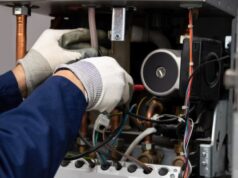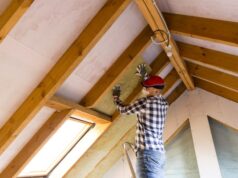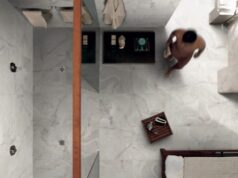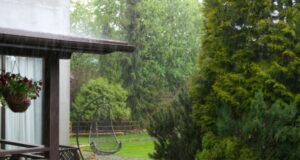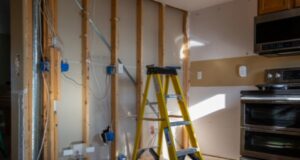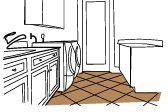
Laundry floors are very similar to kitchen floors in terms of demands, and because they’re often next to each other these rooms often share a floor covering.
How are laundry floors used?
The amount of use that your laundry floor will see depends on its location in the house and on how many people use it. Laundries often lead out to the backyard, and can serve as a busy thoroughfare for this reason. People coming in through the back door may have muddy or dirty shoes, or even be coming in directly from the rain, so in one sense the laundry may even act as a rear foyer, of sorts. The laundry normally also houses the washing machine and a wash basin, and has its own sets of taps for those purposes. Laundry floors may see a lot of foot traffic, and are very likely to get very wet from time to time.

What to look for in laundry floors
Because of the traffic and water they experience, laundry floors need to be:
- Easy to keep clean
- Durable, resistant to scratching and scuffing
- Easy to keep waterproof
Above all, a laundry floor will probably be one of the dirtiest in the house; it’s where most of the domestic products are kept and where a lot of cleaning gets done, so a fair bit of spillage and grime is likely to be present. For that reason, it’s important to choose a floor surface that can be cleaned quickly and easily.
Because the laundry often opens to the backyard, the laundry floor may also get a fair bit of abuse from shoes. Likewise, the floor underneath the washing machine may get scuffed and scratched from the movement and vibration of the machine when it’s on a powerful spin cycle.
While there may not be a great deal of water splashing onto the floor, a burst pipe or tap is a common enough occurrence to warrant proper waterproofing in the laundry. Without decent waterproofing, you run the risk of water seeping into the house’s structural elements, and causing permanent damage to your house as a result of rot.
Other factors
You’re unlikely to be holding cocktail parties or entertaining foreign dignitaries in your laundry. While we all want every part of our house to look good, the laundry is one room where practicality is far more important than aesthetic appeal and comfort. Given the abuse the laundry may experience, it’s worth choosing a floor surface that’s hardy and which will stand the test of time. Choosing a floor surface with a little insulation and bounce will also help to prevent washing machine vibrations from resonating through the house.
Recommendations
Vinyl and linoleum are popular choices for laundries. Both are relatively inexpensive (though linoleum costs more), easy to clean and keep waterproof. Likewise, these surfaces are also relatively soft, and help to absorb some of the vibrations from washing machines. Linoleum is more resistant to scratching than vinyl because it is coloured the whole way through, whereas vinyl will show up scratches and scuffs as white marks. For this reason, lino is likely to keep its looks for longer in a busy laundry.
Other popular choices for laundry floors include tiles, cork, floating floor and wooden floorboards.

